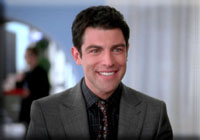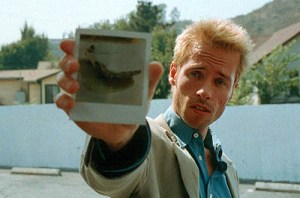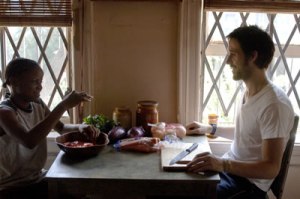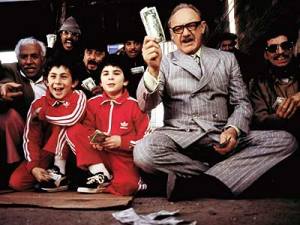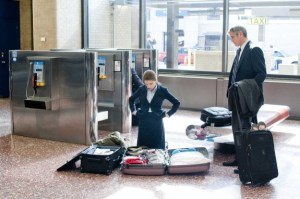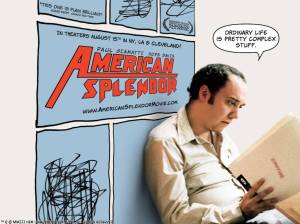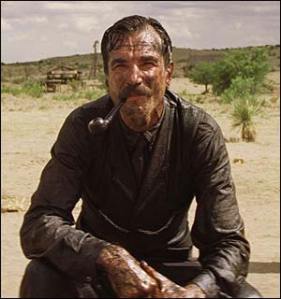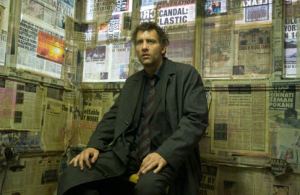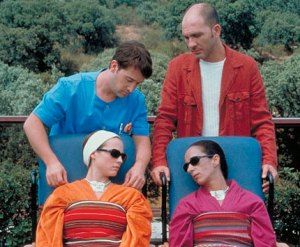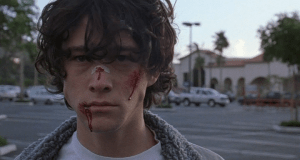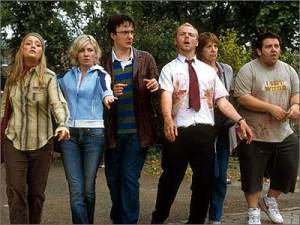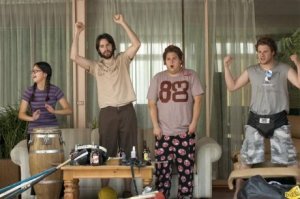Up in the Air
Why Does Pop Culture Like to Hate on Cornell?
“Andy, Cornell called, they think you suck.”
-Michael Scott (Steve Carrell)
I am an alumna of Cornell, class of 1999. I regard those four years of college as some of the greatest in my life. I received a top-notch education, met an array of smart, interesting, and hilarious people, and drank a lot of alcohol. I also met my husband at Cornell and so the two of us often wax poetic about our times there: about getting beers at Ruloff’s, hiking through the gorges (“Ithaca is gorges!”), and heading to the Commons for a great meal. Our daughter has been informed that she, too, will attend Cornell (a move ensuring that she most certainly will not attend Cornell), and we have been dressing the baby in Cornell gear in the hopes that he will get Big Red fever by osmosis. In short, we love Cornell.

So of course we were both delighted when one of our favorite comedies, The Office, gave Cornell a big shout out in the Season 3 premiere “Gay Witch Hunt.” It is in this episode that we first meet Andy Bernard (Ed Helms), Jim’s (Jon Krasinski) new co-worker at the Stamford, CT branch of Dunder Mifflin. During one of the show’s signature “talking head” interviews Andy tells us “I went to Cornell, ever heard of it?” This reference is used to provide the viewer with key information about this addition to The Office’s cast: Andy is threatened by his new co-worker, Jim, and believes that mentioning his prestigious alma mater will make him appear more impressive to the show’s fictional documentary crew. It doesn’t. Nevertheless, I gushed to my husband: “I can’t believe they’re talking about Cornell!”
Over time, however, my enthusiasm for The Office‘s Cornell obsession began to wane. You see, Andy, like Michael, is both incredibly insecure and yet has an inflated sense of self. He is a fool. A boob. The running joke about Andy’s Cornell name-checking is that it reveals his need to brag while at the same time demonstrating that he doesn’t have much to brag about at all. He thinks his Cornell degree is impressive but no one else does.
The series’ most extended Cornell reference occurs in “Employee Transfer,” when Dwight (Rainn Wilson) decks himself out in Cornell gear and proclaims that he will be applying to Cornell, all as a way to get under Andy’s skin. Andy decides to interview Dwight as part of the application process and the scene culminates with Dwight deciding to apply to Dartmouth instead since it is a “vastly superior school.” Indeed, Dartmouth is frequently ranked higher than Cornell, a fact which rankles many a Cornell undergrad. Things are starting to get personal, people.
All of this joking at Cornell’s expense got me wondering: did someone on The Office‘s writing staff know a Cornell graduate who was a total douchebag? Or was one of the show’s writers rejected from Cornell? [Note: a reader just informed me that the character of Andy Bernard is a tribute to former NBC president Kevin Reilly, class of 1984]. Or, is it possible that a Cornell degree has come to be a signifier for a particular kind of character? For example, the holy trinity of Harvard, Princeton and Yale are referenced when we are supposed to see a character as being particularly smart. MIT is used if that person is a science or math geek. If you’re smart but also a free-thinker? Then you went to Brown. And if your character loves to party? Then it’s Arizona State, Ole Miss, or any school with a good football team.
So does The Office have a bone to pick with Cornell? Or are they simply playing off of well-known Cornell stereotypes? Is Cornell synonymous with self-important fools who are not nearly as smart as they think they are? Let’s take a look at some of the other famous, fictional, Big Red alums:
1. The Simpson‘s Sideshow Mel
 Mel first appears in the episode “Itchy & Scratchy & Marge ” as a replacement for the murderous Sideshow Bob. At some point it is revealed that Sideshow Mel is a graduate of Cornell University. Sure, he wears a bone in his hair and communicates via a slide whistle, but offstage he speaks in a lovely British accent (which means he’s smart, y’all!) and once played the role of Biff in Arthur Miller’s Death of a Salesman. He is also lactose-intolerant. Advantage: Cornell.
Mel first appears in the episode “Itchy & Scratchy & Marge ” as a replacement for the murderous Sideshow Bob. At some point it is revealed that Sideshow Mel is a graduate of Cornell University. Sure, he wears a bone in his hair and communicates via a slide whistle, but offstage he speaks in a lovely British accent (which means he’s smart, y’all!) and once played the role of Biff in Arthur Miller’s Death of a Salesman. He is also lactose-intolerant. Advantage: Cornell.
2. Up in the Air‘s Natalie Keener
One of the first things we learn about young, ambitious Natalie (Anna Kendrick), is that she is a recent graduate of Cornell University. By citing Cornell, the movie is not necessarily highlighting Natalie’s intellectual pedigree; that is what references to Harvard, Yale and Princeton are for. Instead, Cornell is meant to show us that Natalie is a hard worker, a striver, even. She is like a yappy dog that won’t shut up until you crouch down and pet it. Luckily, Natalie becomes more likable as the film progresses and we learn more about her life. In a way, Natalie needs to get past her life at Cornell (and the rigid blueprint she had for her life) in order to embrace what she wants. Advantage: Haters.
3. Ugly Betty’s Nick Pepper
I do not watch Ugly Betty. Or rather, I should say that I watched it once, thought it was awful, and have never attempted to watch it again. But from what I have read, the character of Nick Pepper (Max Greenfield) is a Cornell alum. And from what I have read about him, he is quite similar to The Office‘s Andy: he has an inflated sense of self, annoys his co-workers, and dresses in what he believes to be the trendiest of clothes. Normally, I would give this point to the Haters, but given that Ugly Betty is a terrible show, I am going to go ahead and call it a Draw.
4. Made of Honor‘s Tom Bailey
I don’t even need to describe this character, played by Patrick Dempsey, or his relationship with Cornell. The movie is called Made of Honor. Get it? Nope, I don’t either. Why substitute “Made” for “Maid”? Poor use of puns means Advantage: Haters.
5. American Pie‘s Vicky
Vicky (Tara Reid), one of the horny teenagers in this classic teen sex comedy, is headed to Cornell after graduation. Vicky is actually pretty likable: not too uptight, not too arrogant. Yes, she’s played by Tara Reid, but it’s pre-Taradise Tara Reid, so it’s Advantage: Cornell.
In conclusion, it’s difficult to determine exactly what Cornell’s screen image is. Certainly the Cornell screen image is not as solidified as Harvard’s or Penn State’s screen image. So for now, I’ll take the Andy Bernards and the Sideshow Mels as evidence that Cornell has some significance in popular culture. And that’s all we self-important, type A Cornell grads want in the end — a little recognition.
Cornell grads: can you think of any other prominent fictional Cornell alumni? If so, discuss below. And, of course, Go Big Red!
Why AVATAR Makes Me Feel Like an Old Russian Man
Back in graduate school I read a short essay , written in 1928, by three Soviet filmmakers, Sergei Eisenstein, Vsevolod Pudovkin and Grigori Alexandrov. In it, the men worry about the effect that newly developed sound technology would have on the future of the cinema. They fear, for example, that “…misconception of the potentialities within this new technical discovery may not only hinder the development and perfection of the cinema as an art but also threaten to destroy all its present formal achievements.” When I read this I remember thinking that these men probably felt pretty silly by the mid-1930s, when it was clear that sound had not in fact destroyed the artistry of the cinema, but greatly enhanced it. Certainly, early sound films like The Lights of New York (1928, Bryan Foy) did suffer from stilted camera work (since noisy cameras were encased in bulky, sound-proofing boxes) and immobile actors (who crowded around microphones hidden around the film set), but the industry quickly adjusted to the new technology and rebounded. As much as I enjoy a good silent film (Sunrise [1927, FW Murnau], The Crowd [1928, King Vidor], The Playhouse [1921, Buster Keaton]) I greatly prefer sound films (bad film professor!). Technology is good.
However, with the release of James Cameron’s Avatar (2009) I feel a lot like Eisenstein, Pudovkin and Alexandrov must have felt back in 1928. I am suspicious. I am grumpy. I am a naysayer. Now let me state right off the bat that I have not yet seen Avatar. Part of that has to do with the fact that I just had a baby and part of it has to do with the fact that I am fed up with hearing about this film and its status as an industry “game changer.” In the weeks leading up to its release I couldn’t pick up an entertainment magazine or click on a film blog or turn on the radio without reading or hearing about Cameron’s technological marvel.

But it wasn’t the overhyping of the film that bothered me so much as it was the endless stream of reviews that stated that the film was visually stunning but lacking in story. The New York Daily News writes “‘Avatar’ clears the hurdle in terms of being optical candy. Its story, though, is pure cheese.” And Salon.com‘s Stephanie Zacharek says,
“The movie was made, and is designed to be seen, in 3-D, and no matter what anyone — particularly the movie’s studio, 20th Century Fox — tries to tell you, the technology and not the story is the big selling point here: If a less famous and less nakedly self-promotional director had made the exact same story with a bunch of actors in blue latex, the Fandango ticket sales wouldn’t be going through the roof.”
At the risk of sounding like those grumpy old Russians, I have to agree with Zacharek. CGI and 3-D technology should enhance a film, not be its primary draw. Avatar may represent the “future” of filmmaking — as so many bloggers, critics and Cameron himself have claimed — but what about the story? The acting? Are these things not important?
Yesterday the Academy Award nominations were announced and Avatar received a whopping nine nominations. I expected nods for Art Direction and Special Effects, but Best Director and Best Picture? What exactly is being rewarded here ? Shouldn’t Best Picture reward the achievement of the film as a whole, rather than its (spectacular) parts?
Of course, even as I write this I realize that I may be the one in the wrong. Even if Avatar‘s story and dialogue are as cheesy and derivative as the film’s detractors claim, does that mean the film should not be recognized for those things it does exceptionally well? After all, I adored Up in the Air (2009, Jason Reitman) for its clever dialogue, subtle acting and emotionally engaging story, but the film’s actors are rendered through simple camerawork, not motion capture technology. And as far as I know, Up in the Air is not playing in 3-D anywhere.
I’m not being facetious here. Perhaps motion capture and 3-D are the future of filmmaking, a technology which, like the invention of sound, will soon enhance, rather than limit the artistic possibilities of the medium. Rather than a novelty these technologies will become integral to the medium.
So while I vowed to never go see Avatar, I’ve decided that it is time to go (just as soon as I pump enough milk to allow for a 3 hour trip to the movies without the newborn). After I see it I will revisit this post and determine if my grumpy, Luddite view of the film is warranted. In the meantime, for those who have seen Avatar: Did it deserve 9 Academy Award nominations? Is it worth the hype? Is it the best picture of 2009? I’d love to hear your thoughts.
The Best Films of the Decade
Yes my friends, I took a hiatus from blogging for a while. Between end of the semester grading and other professional commitment, as well as my family’s raucous Chrismakkuh celebrations, there simply was not any time. These are my excuses, anyway, for producing a “best of the decade” list weeks after you ceased having the desire to read such arbitrary lists. My bad, ya’ll.
Still there? Okay then, before you read, you should know a few things:
1. I spent much of the 2000s with my DVD/VHS player, dutifully watching non-contemporary films as part of my Film Studies degree. Consequently, I did not see nearly as many new releases as I would have liked.
2. I am not a big fan of blockbuster/franchise films, so I refuse to put any of The Lord of the Rings films on a “best of” list.
3. I favor films with a melancholy bent because I enjoy a good cry.
Now here, in no particular order, are my favorite films from the last 10 years:
Brokeback Mountain (2005, Ang Lee)
To me this is a near perfect film. Flawless cinematography (I am thinking of long shots of white sheep running up the side of a green slope), intelligent mise en scene (the slow death of Anne Hathaway’s sexuality is marked by her ever-blonder coif and increasingly talon-like nails) and a spare script. And then there’s the cast. Everyone in this film was wonderful, but the stand out was, of course, Heath Ledger, who plays Ennis as a man whose desires are so tamped down that he literally swallows his own words before uttering them. When Ennis embraces Jack’s denim shirt in the film’s final scene, it’s a moment that rips your heart apart. Timely, beautiful, perfect. Fuck Crash (2005, Paul Haggis). Yeah, I’m still bitter.
Amelie (2001, Jean-Pierre Jeunet)
Overly precious at times? Sure. But it’s irresistable in its preciousness. One of my favorite sequences occurs early in the film, when the narrator explains the little things in life that Amelie enjoys: “Plunging her hand deep into a sack of grain, cracking creme brulee with a teaspoon and skimming stones on the Canal St. Martin.” Here we are treated to a dizzying, high angle shot of the canal which sweeps over Amelie (Audrey Tautou) as she squats on a bridge to skip stones. Little moments like that take my breath away.
Memento (2000, Christopher Nolan)
Trapped in the head of Leonard (Guy Pearce), who lost his short-term memory after the traumatic murder of his wife, we experience life as he does — en medias res. We, like Leonard, find ourselves in the middle of situations — at one point Leonard finds himself running and doesn’t know if he’s being chased or the one doing the chasing — that only make sense when we move backwards and retrace our steps. Luckily, Leonard has a “system”–tattoos, notes, reminders placed around his abode. Yes, it’s a gimmicky concept for a film, but what always grabbed me about Memento is how it provides such a useful allegory for the mourning process. Leonard’s unceasing drive for revenge is a sublimation of his desire to work through the trauma of his wife’s death. At one point Leonard explains “I don’t even know how long she’s been gone…I lie here not knowing how long I’ve been alone. So how can I heal? How am I supposed to heal if I can’t feel time?” See, now I’m all shivery.
Once (2006, John Carney)
I’ll be totally honest: this movie could have been total crap and it would still be on this list as long as it retained its glorious, haunting soundtrack. But thankfully, Once isn’t crap. On the one hand it’s standard musical fare: a heart-broken guy (Glen Hansard) and a lonely girl (Marketa Irglova) have a meet cute (he’s singing on the streets, she needs her vacuum cleaner fixed) and discover that they make beautiful music together. Really, really beautiful music. What is wonderful about Once though, is how seamlessly musical numbers are woven into the fabric of the diegesis. Every time the guy and the girl (they are never given proper names) open their mouths or tickle the ivories, it makes perfect narrative sense. And when they sing “Falling Slowly” in the middle of a piano store, their voices tentatively coming together for the first time, it’s absolutely magical. I’m talking full goosebumps. I should also add that, next to this year’s Up in the Air, Once contains one of the most realistic and refreshing conclusions to a love affair that I’ve seen in years.
Adaptation (2002, Spike Jonze)
Adaptation is a film about, well, adaptation: cinematic, biological, and social. Charlie Kauffman (Nicholas Cage) is asked to adapt Susan Orlean’s novel, The Orchid Thief, into a splashy screenplay and it is his struggles to do so that create the fascinating film we watch. A skewering of Hollywood, a meditation on passion (and its absence), and, weirdly, an action adventure story, Adaptation is Kauffman’s most inventive script to date. And as a result of his performance in this film Nic Cage has an eternal free pass to make shit, which he continues to do with impunity.
Half Nelson (2006, Ryan Fleck)
In his best screen performance to date, Ryan Gosling plays Dan Dunne, an idealistic Brooklyn teacher trying to teach History to his primarily African American and Hispanic middle school students. Dan cares about teaching and about his students. Dan believes he can make a difference. Sound like a cliché yet? Oh right, there’s one more thing: Dan’s got a wicked crack addiction. When a favorite student, Drey (Shareeka Epps), catches him smoking crack in a school bathroom, the two form an unlikely alliance. Drey wants Dan to stop doing drugs and Dan wants Drey to stay out of the drug trade. Both ultimately let each other down. The film is equally effective as a parable about the frustrations and despair of the political Left and as a portrait of America’s failed school systems.
Royal Tenenbaums (2001, Wes Anderson)
There are so many things to love about this movie: the deadpan narration by Alec Baldwin, the quirky cast, the soundtrack. But best of all is the mise en scene. Every shot in the film is crammed with details — Henry Sherman’s fastidious bow-ties (Danny Glover), Margot Tenenbaum’s (Gwyneth Paltrow) bookshelves crammed with slim plays, and the endless rows of Richie’s (Luke Wilson) framed drawings, dutifully hung by his adoring mother (Angelica Houston). Yet despite it’s loopy surface, the film is filled with moments of deep human connection. One of my favorite scenes in the film is an exchange between Chas Tenenbaum (Ben Stiller) and his future step-father, Henry. Over the course of the film we learn that Chas reacts to his wife’s untimely death, not by mourning, but by keeping his two young sons on a short leash — expecting the next disaster to strike at any moment. Rather than break down, he takes control. On the day of his mother’s marriage to Henry, a union Chas has opposed through much of the film, Chas is confused to discover that Henry has an adult son named Walter (Al Thompson). Henry has to remind Chas that he has been married before and that his wife died. He is a widower. As Henry, Walter and Richie adjust their ties in the mirror, Chas approaches the group of men and begins to adjust his own tie as well. He then announces, as if the news were completely new, “You know, I’m a widower myself.” Henry pauses, turns towards Chas, and places his hand on his shoulder “I know you are, Chas.” It’s a simple exchange, a throwaway moment, but it grabs me every time.
Old Boy (2003, Chan-wook Park)
If someone kidnapped you and kept you imprisoned in a bland apartment for 15 years with only a television for company and the same dumplings to eat day after day, you’d be pretty pissed off, right? Old Boy follows Oh Dae-Su (Choi Min-sik), businessman-turned-martial arts expert, as he seeks revenge for his years of imprisonment, and boy is he mad! The film is riddled with graphic violence but my favorite scene by far is the infamous “hammer scene” in which a wounded Dae-Su fights a horde of men with nothing but a hammer. Here the fighting is lugubrious and painful, men groan and creep and fall. And the best part is that Park films it in one long take like a slow, bloody waltz.
Kill Bill: Vol. 1 (2003, Quentin Tarantino)
I have always been critical of Tarantino’s reluctance to engage in the necessary task of editing his films. For me, Inglorious Basterds (2009) was long and flabby. Kill Bill: Vol. 1, on the other hand, felt just right to me (perhaps because Tarantino had to cleave the film into 2 volumes?). I suppose I’m a sucker for films in which women are given meaty, kick ass roles. How can you not love a film in which Uma Thurman informs the survivors of a massacre created by her own hands, “Those of you lucky enough to have your lives, take them with you. However, leave the limbs you’ve lost. They belong to me now.” Kick. Ass.
Grizzly Man (2005, Werner Herzog)
Using the 100 hours of footage that Timothy Treadwell, aka, the “Grizzly Man,” left behind after his brutal death, Herzog attempts to make sense of the man’s seemingly insane desire to live among wild bears. Was Treadwell crazy? Probably. But this is not the only message of the film. Treadwell was also a man filled with passion and love. The film could have been exploitative, but it’s not. It’s simply sad.
Up in the Air (2009, Jason Reitman)
Critics have been stumbling over each other to praise this movie, but for once the praise is deserved. As so many have already noted, Up in the Air is a timely portrait of today’s dire economic climate. As I sat in the darkened theater, listening to real Americans explain how losing their jobs was going to impact their lives and their families, I couldn’t help but think of all the people I know right now who have lost their jobs, have had their hours cut or who simply cannot find work. But then,oddly enough, the film also soars as a romantic comedy. The rapport between Ryan Bingham (George Clooney) and Alex (Vera Farmiga), two commitment-phobes addicted to air travel and impersonal hotel rooms, is honest and funny. And can we talk about George Clooney for a minute? Every look, every gesture, every half-smile was perfect. Take the scene at Ryan’s sister’s wedding reception. In a few dialogue-free shots we see Ryan’s walls come crashing down. We can actually see him falling in love (0r what he believes to be love) with Alex. And then there’s Natalie Keener (Anna Kendrick), who was truly wonderful as a smart, ambitious young woman who realizes, as most of us do around the age of 23, that the “grand plan” we had for ourselves in college doesn’t really translate in the real world. Finally, the film’s ending (I promise, no spoilers here) was the perfect balance between realism and idealism, despair and hope. It’s the kind of film that makes you appreciate your own very heavy backpack.
And the rest:
Lost in Translation (2003, Sofia Coppola)
Thank you Ms. Coppola, for not letting us hear what Bob (Bill Murray) says to Charlotte (Scarlett Johansson).
American Splendor (2003, Shari Springer Berman)
Paul Giamatti is a god.
District 9 (2009, Neil Blomkamp)
A science fiction social problem film turned explode-y action adventure film. I was literally on the edge of my seat throughout the entire film. Then I bawled like a baby. I’m not sure that’s ever happened before.
City of God (2002, Fernando Meirelles)
 This film is noteworthy for its stunning cinematography and kinetic editing alone, but it’s translation of the classic gangster formula to the slums of Rio de Janeiro is what makes this one of the stand out films of the decade.
This film is noteworthy for its stunning cinematography and kinetic editing alone, but it’s translation of the classic gangster formula to the slums of Rio de Janeiro is what makes this one of the stand out films of the decade.
There Will Be Blood (2007, Paul Thomas Anderson)
Dirty, greasy and bloody. If movies had an odor, There Will Be Blood would smell like sweaty men and rust. I drink your milkshake!
Children of Men (2006, Alfonso Cuaron)
OK, I’ll admit it: My husband and I watched this one with English sub-titles because we found the British accents too difficult to understand. And we still loved it. So there.
Talk to Her (2002, Pedro Almodóvar)
You have to love a film containing a beautifully shot, black and white silent film, “The Shrinking Lover,” depicting a tiny man and an enormous vagina. Enough said.
Brick (2005, Rian Johnson)
Sure, you all fell in love with Joseph Gordon-Levitt in 500 Days of Summer (2009, Marc Webb). But I fell in love with him here, spouting hard-boiled lines like “Throw one at me if you want, hash head. I’ve got all five senses and I slept last night, that puts me six up on the lot of you.”
Shaun of the Dead (2004, Edgar White)
Knocked Up (2007, Judd Apatow)
Debbie (Leslie Mann): I’m not gonna go to the end of the fucking line, who the fuck are you? I have just as much of a right to be here as any of these little skanky girls. What, am I not skanky enough for you, you want me to hike up my fucking skirt? What the fuck is your problem? I’m not going anywhere, you’re just some roided out freak with a fucking clipboard. And your stupid little fucking rope! You know what, you may have power now but you are not god. You’re a doorman, okay. You’re a doorman, doorman, doorman, doorman, doorman, so… Fuck You! You fucking fag with your fucking little faggy gloves.
Doorman (Craig Robinson): I know… you’re right. I’m so sorry, I fuckin’ hate this job. I don’t want to be the one to pass judgment, decide who gets in. Shit makes me sick to my stomach. I get the runs from the stress. It’s not cause you’re not hot, I would love to tap that ass. I would tear that ass up. I can’t let you in cause you’re old as fuck. For this club, you know, not for the earth.
Debbie: What?
Doorman: You old, she pregnant. Can’t have a bunch of old pregnant bitches running around. That’s crazy. I’m only allowed to let in five percent black people. He said that, that means if there’s 25 people here I get to let in one and a quarter black people. So I gotta hope there’s a black midget in the crowd.Note: thank you to the poster on IMDB.com who transcribed this wonderful exchange from Knocked Up so I didn’t have to.
I would love to hear your thoughts on your favorite moments from these films or about any glaring omissions.



